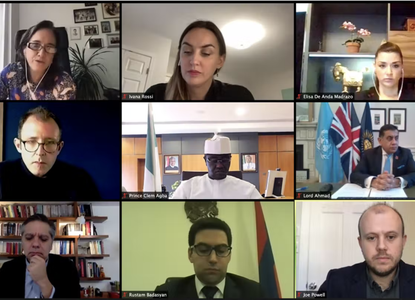Video – COVID-19 and Corruption: Tracking the trillions
This panel of experts discussed the issues at the heart of tackling corruption in healthcare and disaster response and how beneficial ownership is key for ensuring an equitable, fair and corruption-free global economic response. Moderated by Simon Long, International Editor for the Economist with panellists from government, industry, civil society and academia including John Penrose MP, the UK government Anti-Corruption Champion, Rachel Cooper, Health Direction are Transparency International UK, Professor Sope Williams-Elegbe Head of Department of Mercantile Law, and the Deputy Director of the African Procurement Law Unit, Stellenbosch University, Che Sidanius, Refinitiv, Global Head of Regulations & Industry Affairs and Thom Townsend, Executive Director of OpenOwnership.
Five trillion dollars and rising have been committed by the International Monetary Fund, the European Central Bank and G20 countries to support the global economy through the corona crisis and the impending economic depression. Companies, in all their various forms, will be the ultimate recipients of much of this unprecedented commitment.
This influx of money will help stabilise the global economy, even as it is transformed beyond current recognition. Tracking the trillions is paramount to ensuring the funds are allocated and managed correctly. Lenders want to feel assured that money is going where it is intended, whilst governments want to ensure their taxpayer money helps domestic businesses and deals with the public health crisis. Governments in Argentina, Denmark, France and Poland have been the first to announce they will not support companies based in tax havens.
Knowing who ultimately owns companies (their beneficial owners) is a key piece of data that allows governments and legal authorities to check that money is going where intended, and it is this information which is sorely lacking in many jurisdictions. The IMF’s Managing Director Kristalian Georgieve’s recent message to governments receiving USD 1 trillion in COVID-19 assistance was, “Spend what you can but make sure to keep the receipts”. While this strong message is welcome, there is more that international financial institutions can do. Particularly as there are sound economic reasons to make ownership transparency a condition for receiving financial assistance.
The Open Ownership Principles were launched at the panel as a practical framework for implementing beneficial ownership transparency to assist governments in addressing the coronavirus crises and tracking their financial support to business.
Related articles and publications
Publication type
Videos
News article


